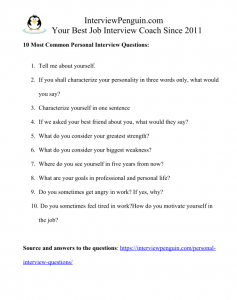Many things matter for the employers. Besides your education and experience (basic requirements for the job), they are interested in your motivation, attitude to various situations that happen at work, your goals, your personal traits. They try to understand who you are, what you like to do, and if all of that is a good fit for the job you try to get with their organization, and for the team they already have in place.
In this article we will have a look at some interview questions we can label as personal, though they have also other names and classifications in the HR jargon. However, the most important thing for you is not the classification, but the way you should answer each of the questions. Let’s have a look at it right now.
Table of Contents
Tell me about yourself.
Try to mention something from both your personal and professional life, suggesting that you have the right personality for the job. If you have any relevant experience or education for the position, you should definitely include it in your introduction.
The key is to focus on your strengths, something that makes from you a good candidate for the job, and at the same time share something from your personal life with the hiring managers, clearly demonstrating that you want to talk in an open and genuine manner in this interview. You can check 7 sample answers to the question here.
If you shall characterize your personality in three words only, what would you say?
Three words are three words–you should do exactly what they ask you to do. This question tests also your listening skills and ability to talk to the point. Show some confidence. Pick the strengths that are relevant for your job, and mention them as your core characteristics.
Try to avoid general formulations, such as “best employee ever”, or “the very best manager”. Pick rather three adjectives, for example “responsible, hardworking, honest”, or “motivated, loyal, intelligent”. Basically some positive characteristics that tell something about your readiness for the job. For some inspiration you can check also sample answers to “Describe yourself in one word” interview question.
Characterize yourself in one sentence.
Again, you should use just one sentence, trying to summarizing the value you can bring to their team. Having said that, they do not specify how long your sentence should be. You can show some creativity here, coming up with an extremely long compound–which is still one sentence, but at the same time allows you to characterize yourself in more detail.
How would your best friend describe you?
It is highly unlikely that they will contact your friends after the interview, but it is not impossible. So you can say whatever you want at this point. Claiming that they would say that you were someone they could rely on, or someone extremely responsible, is definitely a good answer.
You can always elaborate on your answer, saying that though you try your best to be a good friend, to help people from your circles, and simply to have meaningful relationships with others, you cannot say how exactly the others perceive you, and what they would say about you. If your not sure what to say, 7 sample answers to the question may help you find the right words.
What do you consider your greatest strength?
Try to pick something relevant for the job. It can be communication skills, technical skills necessary for the job, ability to learn quickly–especially a good choice if you are just starting your career, leadership skills, ability to adapt quickly to changing conditions, etc.
It is always good to add that though aware of your strengths, and confident that you will handle the job, you are not complacent and want to continue working on your abilities in the future, trying to become the best manager/engineer/teacher/other position you can be.
Where do you see yourself in five years from now?
They try to understand if you have some goals, if you know what you want to do later in your life. Try to connect your future with their company, or speak about some goals you have in your private life.
Remember that you do not have to stick to the promises you made in an interview. You can say them that you want to be with them for the next ten years, and you can still leave a company in three months time. That is the way employment market works. But in general you should have some vision of your future, at least a blur vision, because otherwise you may struggle with motivation in work…
Do you sometimes get angry at work? If yes, why?
You can say that you are a results-driven person, and can get mad when things do not go the right way, when you do not reach the expected results.
Or you can say that you sometimes struggle to forget your personal life when working, and are angry because something in your private life does not work as you wished it did (for example the relationship with your partner). One way or another, you should ensure your interviewers that you can control your anger, and do your best to stay calm in work. You can even talk about conflicts with colleagues at this point, but be sure to mention that while you can get angry, you do not dwell on conflicts for too long, and can move on.
How do you motivate yourself in the job?
The key is to show them that you understand how your job relates to your goals, in both personal and professional life. You can simply say that the things you want to achieve (or buy for you, or for your family members), or the bills you have to pay each month, help you to stay motivated and work hard every day.
Of course if you apply for some amazing and fascinating position, a job you always wanted to have, and one that happens to pay 100K annually, you can claim that you do not struggle with motivation, simply because you love this type of work… For more ideas, check sample answers in our dedicated article “What motivates you at work” interview question.
Other personal questions you may face
- What do you want to accomplish in your life?
- Can you tell us something about your experience?
- What is the most important thing you’ve learned at school?
- What do you like to do in your spare time?
- Tell us one thing about yourself you wouldn’t want us to know.
- Are you willing to travel, or relocate in the future?
- Are you a team player?
- What accomplishments are you most proud of?
- Do you consider yourself successful?
- If you were an animal, what would you be?
- ….
Final thoughts: Do they really need to ask personal questions?
A skilled HR manager should tell your personal traits, and strengths and weaknesses, from the way you walk, talk, look at them, and answer any questions or tests in an interview. And they should do it with great precision.
The real HR professionals do not need to inquire about your personality. They will simply understand what they need to know, after talking to you for five or ten minutes (at least in terms of your personal traits).
But we should not forget that not all interviewers are skilled in what they do. Think about a CEO of a small business–perhaps leading their first ever job interview, or a person who is just starting in human resources.
Or perhaps a recruiter who has chosen a wrong job, someone who was not gifted with emotional intelligence and struggles with assessing someone’s personality and character. For all these people (and a chance that you will meet one of them in an interview is good enough to count with it happening), your answers to personal questions can be helpful, and make sense…
Ready to answer personal interview questions? Great! But they aren’t the only tricky questions you will face in your interview. Check also!
* You can also download the list of some personal questions in a simple, one-page long .PDF, and practice your interview answers anytime later, even when offline:


